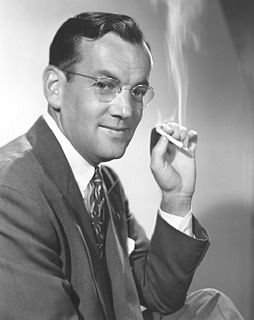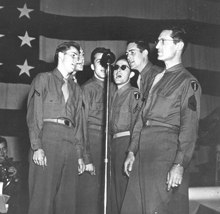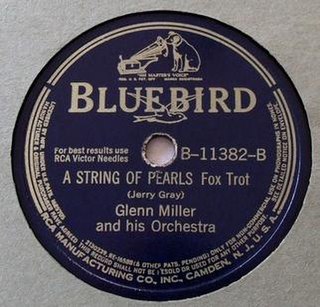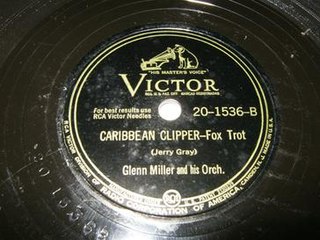
Paul Samuel Whiteman was an American bandleader, composer, orchestral director, and violist.

"In the Mood" is a popular big band-era No. 1 hit recorded by American bandleader Glenn Miller. It topped the charts for 13 straight weeks in 1940 in the U.S. and one year later was featured in the movie Sun Valley Serenade. "In the Mood" is based on the composition "Tar Paper Stomp" by Wingy Manone. The first recording under the name "In the Mood" was released by Edgar Hayes & His Orchestra in 1938.

"That Old Black Magic" is a 1942 popular song written by Harold Arlen (music), with the lyrics by Johnny Mercer.. They wrote it for the 1942 film Star Spangled Rhythm when it was sung by Johnny Johnston and danced by Vera Zorina. The song was nominated for the Academy Award for Best Original Song in 1943 but lost out to "You'll Never Know".
"Ac-Cent-Tchu-Ate the Positive" is a popular song which was published in 1944. The music was written by Harold Arlen and the lyrics by Johnny Mercer. The song was nominated for the "Academy Award for Best Original Song" at the 18th Academy Awards in 1945 after being used in the film Here Come the Waves. It is sung in the style of a sermon, and explains that accentuating the positive is key to happiness. In describing his inspiration for the lyric, Mercer told the Pop Chronicles radio documentary "[my] publicity agent ... went to hear Father Divine and he had a sermon and his subject was 'you got to accentuate the positive and eliminate the negative.' And I said 'Wow, that's a colorful phrase!'"

"I Will Follow Him" is a popular song that was first recorded in 1961 by Franck Pourcel, as an instrumental titled "Chariot". The song achieved its widest success when it was recorded by American singer Little Peggy March with English lyrics in 1963. The music was written by Franck Pourcel and Paul Mauriat. It was adapted by Arthur Altman. The English lyrics were written by Norman Gimbel.

"Moonlight Serenade" is an American swing ballad composed by Glenn Miller with subsequent lyrics by Mitchell Parish. It was an immediate phenomenon when released in May 1939 as an instrumental arrangement, though it had been adopted and performed as Miller's signature tune as early as 1938, even before it had been given the name "Moonlight Serenade." In 1991, Miller's recording of "Moonlight Serenade" was inducted into the Grammy Hall of Fame.

"(I've Got a Gal in) Kalamazoo" is a #1 popular song recorded by Glenn Miller and His Orchestra in 1942. It was written by Mack Gordon and Harry Warren and published in 1942. It was featured in the musical film Orchestra Wives and was recorded by Glenn Miller and His Orchestra, featuring Tex Beneke, Marion Hutton and The Modernaires, who released it as an A side 78 in 1942, 27934-A. The B side was "At Last".

"Whispering" is a popular song. "Whispering" was first published in 1920 by Sherman, Clay & Co., of San Francisco. The initial 1920 copyright and first publishing attributes the lyrics to Malvin Schonberger and the music to John Schonberger.

Between 1938 and 1944, Glenn Miller and His Orchestra released 266 singles on the monaural ten-inch shellac 78 rpm format. Their studio output comprised a variety of musical styles inside of the Swing genre, including ballads, band chants, dance instrumentals, novelty tracks, songs adapted from motion pictures, and, as the Second World War approached, patriotic music. Non-instrumental songs featured Miller's various vocalists, generally Ray Eberle or Marion Hutton before 1940, with Tex Beneke, vocal group The Modernaires, and Skip Nelson all making studio vocal appearances after the turn of the decade. Beginning with An Album of Outstanding Arrangements in 1945, this collection has been repackaged into various album formats over time with release on 78 rpm, 10 and 12 inch LP, 7 inch 45 rpm, compact cassette, 8-track, compact disc (CD), and digital formats.

The Crew Chiefs were a vocal group popular in the 1940s, known for accompanying Tex Beneke, Glenn Miller, and Ray McKinley. Member Artie Malvin co-wrote the song "I'm Headin' For California" with Glenn Miller in 1944.

"A String of Pearls" is a 1941 song recorded by Glenn Miller and His Orchestra on RCA Bluebird, composed by Jerry Gray with lyrics by Eddie DeLange. The song is a big band and jazz standard.

"I'm Headin' For California" is a 1944 song composed by Glenn Miller and Arthur Malvin and performed for radio broadcast. The song was released in 1946 as a 78 single by the Glenn Miller Orchestra led by Tex Beneke. The song was Glenn's last composition.

"Caribbean Clipper" is a big band and jump song recorded by Glenn Miller and his Orchestra in 1942. The song was composed by Jerry Gray with lyrics by Sammy Gallop. The song was part of a number of songs—including "Sun Valley Jump", "Here We Go Again", "The Spirit Is Willing", "The Man in the Moon" and "A String of Pearls"—written by Gray, a member of the Glenn Miller Orchestra as an arranger, specially for Glenn Miller, who recorded it in 1943. The song was registered with the United States Copyright Office on October 23, 1942, by the Mutual Music Society.

"I Sustain the Wings" is a 1943 big band and jazz instrumental co-written by Glenn Miller. The instrumental was the theme for the eponymous radio program broadcast on CBS and NBC from 1943 to 1945.

"It Must Be Jelly " is a 1942 jazz and pop song recorded by Glenn Miller and His Orchestra. The song was released as an RCA 78 single by Glenn Miller in 1944. Woody Herman also released the song as a single and as a V-Disc.

"Tomorrow's Another Day" is a 1935 song composed by Glenn Miller for the Dorsey Brothers Orchestra. The song was released as a 78 single by the Dorsey Brothers Orchestra on Decca Records.
"The Technical Training Command" is a 1943 big band and jazz song performed and co-written by Glenn Miller. The instrumental version was a theme for I Sustain the Wings, the radio program broadcast on CBS and NBC from 1943 to 1945.






















